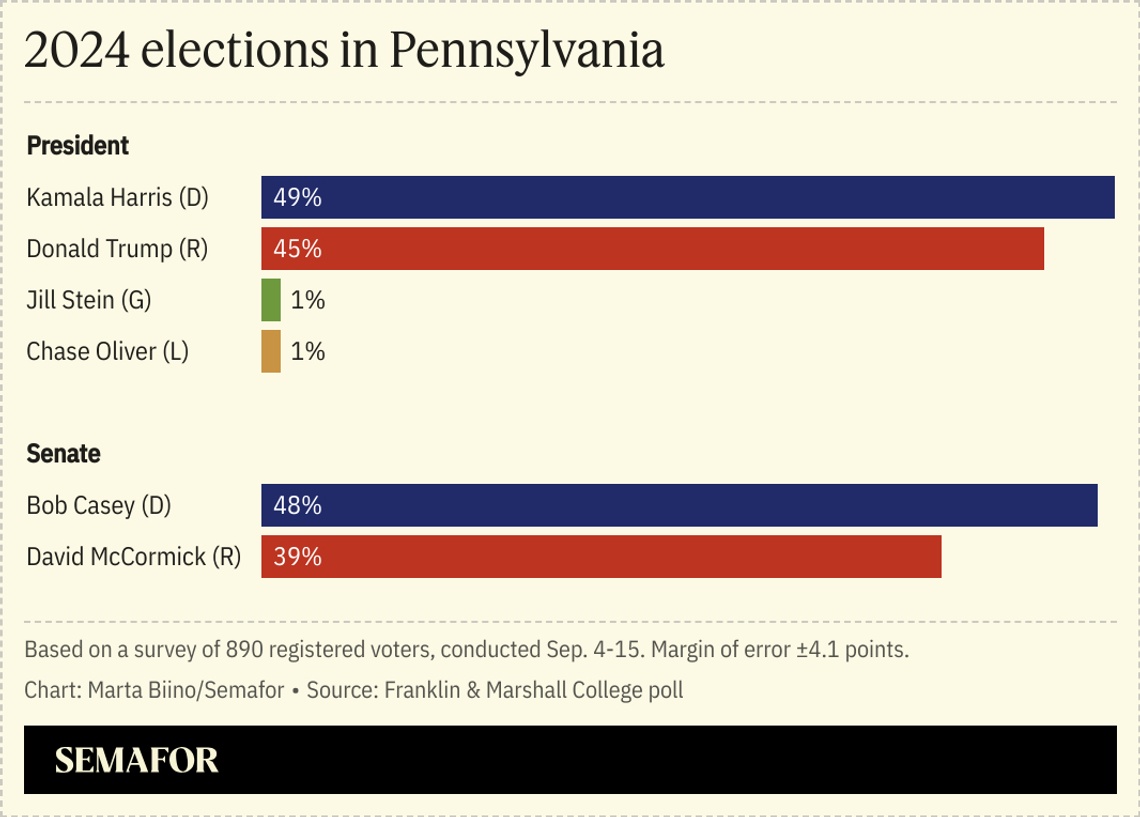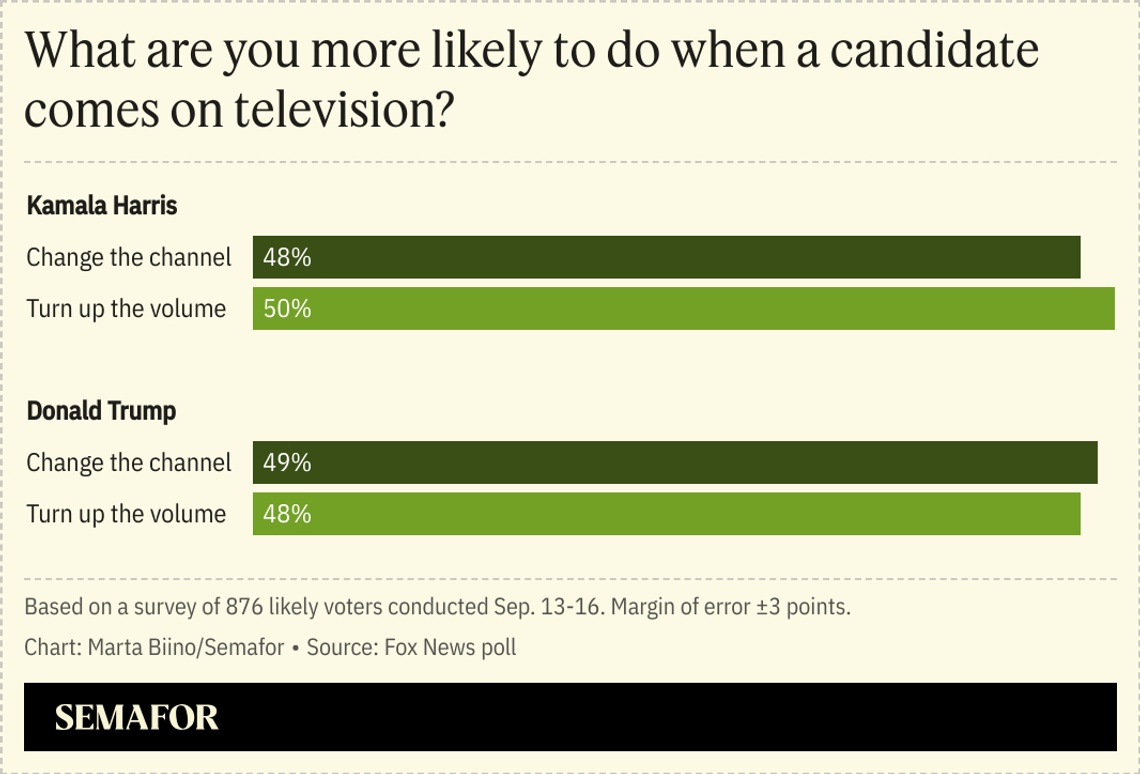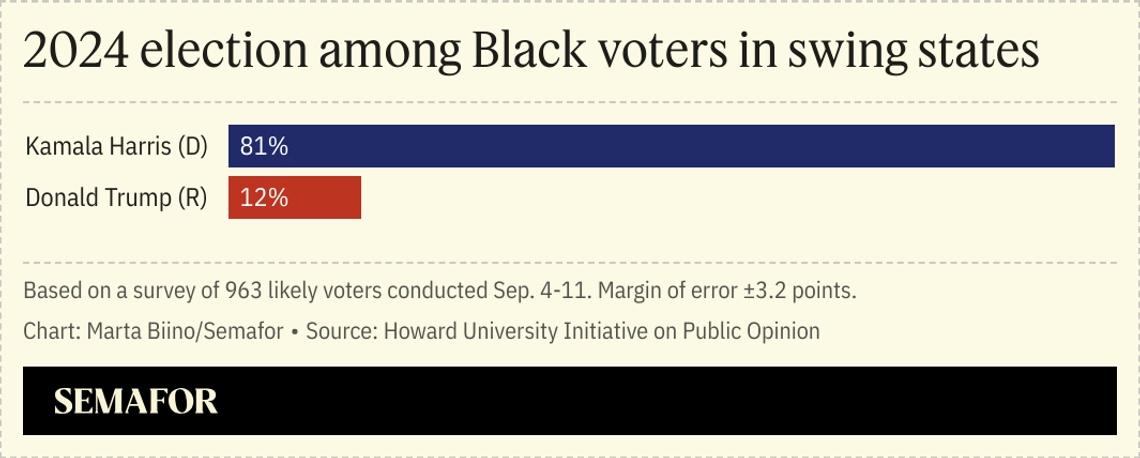 Polls On Wednesday night, post-debate polls of Pennsylvania shot up like sunflowers — eight, of varying quality, all of them showing competitive races and a shrinking number of undecided voters. One pattern: Harris is viewed far more positively than the president, and slightly more positively than Trump. Another pattern: Views of “the economy” are still grim, but Harris has cut into Trump’s advantage on the question, which Biden was never able to do. The Pennsylvania-based F&M also finds the economy dwarfing interest in any other issue, with 8% of voters naming “immigration” and 1% naming “crime” instead. That could explain some of Harris’ resilience to Trump and Republican attack ads, which have focused heavily on the border and her record as San Francisco DA — top of mind for many Republicans, but not for swing voters.  Fox’s post-debate poll found an insignificant shift in the two-candidate ballot test — clear favorability advantages for the Harris-Walz ticket, but a statistical tie with Trump-Vance. But this question, which few pollsters ask, gets at how Harris has been able to improve her numbers since June. In 2016, when Fox’s polling showed Hillary Clinton ahead of Trump, just 41% of voters said they turned up the volume when they saw her on TV. A majority changed the channel.  Four years ago, according to exit polling, Donald Trump won 12% of the Black vote. That represented a 50% increase from his support in 2016, enough to tighten some margins in rust belt cities and the south. Trump was improving on that in his rematch with Joe Biden, but the Democrats’ switch-up changed things: He has held onto his new Black support, but made no gains. Trump scores best with this electorate on the economy and immigration, with around one in five Black voters saying his stances make it “more likely” that they’d support him. Harris’ weakest issue — more than immigration — is her stance on Israel’s war in Gaza, which only around 60% of Black voters cite as a reason they support her, a lower percentage than for other aspects of her campaign. Ads Jeff Jackson/YouTube Jeff Jackson/YouTube- Harris for President, “Monster.” Hadley Duvall may be the most influential non-politician in the Democratic Party. Last year, she told her story — years of sexual abuse by her stepfather, culminating in a pregnancy — in ads for Kentucky Gov. Andy Beshear. Duvall told it again at the Democratic National Convention, and tells it again here, remembering the “monster” who wrecked her life, and worrying that the Dobbs decision will put more women in her place: “Donald Trump did this, he took away our freedom.”
- Jeff Jackson for Attorney General, “Opening Statement.” Democrats are trying to make every North Carolina race about extremism, welding their opponents to Mark Robinson. Democratic Rep. Jeff Jackson has run that play against Rep. Dan Bishop, whose conservative record (he wrote the state’s gender-specific “bathroom bill”) predates Robinson’s career. Bishop’s tried to make the race about courtroom experience — he has more of it — and Jackson’s response ad puts him inside a courtroom, promising to fight criminals, then asking his family (in the jury box) if he pulled it off.
- NRCC, “Criminals’ Favorite Politician.” Whatever they end up doing to its electoral vote, Nebraska Republicans are on defense in Omaha, where Rep. Don Bacon faces a rematch with Tony Vargas. Four years ago, Vargas joined a bipartisan group of state senators to reform the state’s incarceration system, passing a bill that then-Gov. Pete Ricketts vetoed. Republicans resurrect that bill here, warning that Vargas voted to let “criminals be released into our communities.”
Scooped!A few weeks ago, I stood a few feet from Mark Robinson at campaign stops where he bemoaned how Democrats were running against him. “They want to ask me questions about what I said on Facebook 10 years ago,” he said, accusing his opponents of obsessing over dashed-off, offensive comments instead of the needs of North Carolina. At the same time, CNN’s Andrew Kaczynski was digging through posts Robinson had allegedly made years earlier, on much more obscure websites, under an online pseudonym. Even if you know the gist now, it’s worth reading that story, how the reporting was done, and how the comments were verified even as Robinson went on the record to deny them. Next - 11 days until the CBS News vice presidential debate
- 46 days until the 2024 presidential election
- 88 days until the Electoral College votes
David recommendsDemocrats have been slamming a panic button all year, elevating and highlighting the most far-right figures they can find, warning that they’ll be in the corner offices of a new Trump administration. One of their most-cited figures: Mike Davis, a hard-charging conservative lawyer who’s joked about becoming Trump’s attorney general, putting critics in “gulags,” and slamming cage doors on migrant children. I’ve talked with Davis for stories, but Politico’s Adam Wren spent a ton of time with him this summer, figuring out when he was trolling the left and when he was being serious. The challenge, as Wren found when some Davis fans tried to trap him and delete his notes: Some people think the trolling is for real. |